Zero waste, plastic-free, low carbon living: do individual actions matter?
As someone who has written about individual action (such as making better personal choices, and eco-friendly swaps) a lot, I’m sure you can guess where I’m going with this. Yes – spoiler alert – our individual actions matter. But what do we actually mean when we say that they ‘matter’? Is individual action really enough? What else can we do beyond the simple swaps and personal choices?
Last year felt like a turbulent year for the planet. The Amazon, Indonesian, Borneo and the Congo rainforests were on fire, cyclones hit India and Bangladesh, there was a heatwave in Europe, flooding in Venice and Japan, a typhoon in the Philippines; and we began 2020 with unprecedented bushfires in Australia.
In the face of such disaster, clutching your reusable coffee cup really doesn’t feel like much of a comfort.
I have to tell you, the events of last year definitely shook me. I don’t just mean the weather events, but the narrative around them by those with vested interests in maintaining the status quo, the political decisions being made (or not made), and the seeming inaction on the part of those in power (manufacturers, corporations, businesses, politicians, governments).
I’ve felt angry, I’ve felt sad, I’ve felt frustrated, I’ve felt furious, I’ve felt despondent. Have I felt hopeless? I’ve possibly come close once or twice. But through all the ups and downs, I’ve felt determined. Determined to do what I can.
And as big and sometimes daunting as these issues can seem, there is definitely a place for individual action.
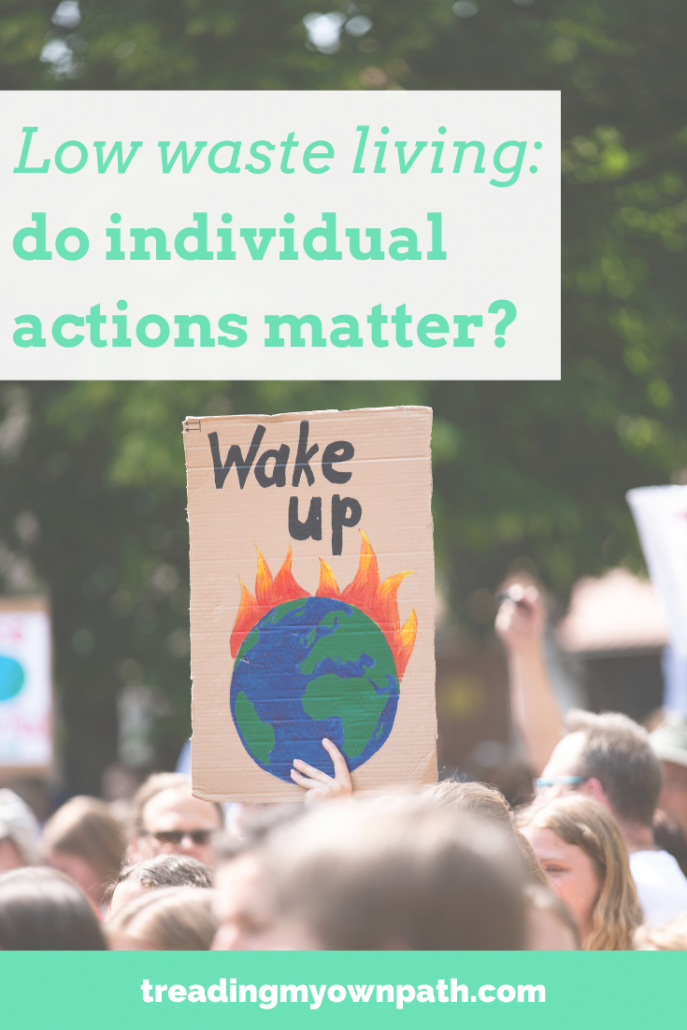
Why individual actions matter
Everything we do and every choice we make has some kind of impact, so let’s have the best impact we can. Why wouldn’t we want to make the best choices that we can? If I know that there is a better option, I have access to that option and there are no barriers to me making that choice, it’s a no-brainer. For me it’s about living my values. Whether that’s consuming less, buying ethical and fair trade, avoiding plastic, boycotting fast fashion, choosing vegan, or something else, trying to do better for the planet, people and animals is always going to be a good thing.
It’s about being a good citizen. Recognizing that others are affected (for good or bad) by the choices we make. We are voting with our money about the kind of world we want to live in when we make choices about the products we buy and businesses we buy from (or choose to boycott).
Small choices add up. You’ve probably read the quote “it’s only one straw, said 8 billion people”. If we make choices often – or if many of us are making these same choices – the opportunity to have an impact is huge. When lots of people are making these same choices, businesses and governments begin to take note.
We all have the power to influence others, and leading by example is a great way to do that. Whether you inspire your local church group to ditch the single-use disposables for events, persuade your school to remove plastic straws from the dining room, encourage your boss to create a sustainability action plan at work on influence your climate-denying uncle to invest in a reusable coffee cup, our actions and choices create ripples. Slowly but surely, we can demonstrate a different way of doing things, and create a new normal.
It feels good to make sustainable and ethical choices. Simple but true.
Where individual actions fall short
Individual swaps alone do not challenge – and change – the systems. For example, you can choose to purchase every single thing you buy without packaging by shopping at bulk stores, make food from scratch and opt for second-hand. But the system still produces food in packaging, advertises ready-to-go meals and prepared food and encourages society as a whole to buy new. You can invest in solar panels and swap the car for a bicycle, but the system still relies on fossil fuels. We can feel good about our personal choices whilst recognising that to change the systems, we have to think beyond individual swaps.
Its not an equal playing field. Not all of us have access to bulk stores, organic vegan cafes, homegrown food, supportive friends, excellent public transport or a cohesive community. We don’t all have fabulous cooking skills, high energy levels, plenty of time, few responsibilities, or a healthy household budget. What’s easy and accessible for one is completely out of reach for another.
Individual actions don’t do anything to address these inequalities – and if we want society as a whole to change, these options need to be within reach of the majority, not the few. Yes, those of us with the opportunity to do more must definitely do what we can, we just need to understand that the change we can bring about with individual actions will always be limited if these choices are out of reach for many.
Individual actions focus on the individual. It’s where a lot of us start – but eventually we need to think beyond ourselves. Whether that’s our local community, our workplaces, social places, sports clubs, churches, our local councils or our politicians. How can we amplify what we know? How can we share what we learn, influence others, question decision-makers, apply pressure and demand change? If we stay at the ‘consumer choice’ level of participation, our influence (and impact) will be limited.
Think about changing your mindset

Individual action, making better personal choices and simple swaps are an excellent place to start. As long as we’re not under the illusion that switching out our washing-up liquid for a plastic-free and eco-friendly option is literally going to save the planet (credit where credit’s due of course, but let’s not overstate our impact).
But in the same way that we don’t get to take too much credit for our individual actions, we also can’t let ourselves take on too much of the burden.
It’s not your fault.
Don’t have access to a bulk store? Drove the car because you couldn’t face walking in the rain for 20 minutes to catch the bus? Forgot your reusable coffee cup and ended up with a disposable? Took a flight to visit your grandma overseas? Being human means being imperfect. It’s not our fault that we don’t have access to everything we’d like access to. It’s not our fault that we live in a system that encourages waste, or that we have to make decisions that are less than ‘perfect’.
We can be a part of the system whilst recognizing that is flawed. We can be part of a system whilst recognizing the need for it to change. Rather than blaming ourselves for choices we have little control over, it’s more productive to see the issue as a fault of a system, and to look for ways to actively change that system for the better.
Stop feeling guilty.
I think a lot of us feel some kind of guilt when it comes to trying to live more sustainably, but as we mentioned earlier, it isn’t a level playing field, and we don’t have access to all the options.
Companies in particular have jumped on this, to shift any blame from them to us.
Some examples of this: companies telling us their packaging is recyclable or compostable, but not investing in infrastructure that ensures their products will actually be recycled or composted where we live (suddenly it becomes our fault for not wanting to take the epic trip to the next town or the council’s fault for not accommodating their product). Another example: airlines giving customers the option of buying carbon offsets themselves (which means only those who both care AND can afford to do so will do so), rather than committing to offset every flight they make themselves out of their profits.
Don’t give companies the satisfaction of feeling guilty for their inaction. If you can’t make a choice that you’d like to make, ask yourself what is stopping you – what part of the system is making it difficult for you? That’s where you need to focus your energy – not on blaming yourself.
Being smug isn’t helpful.
Luckily for some of us, we have easy access to the bulk store, we live right next to the bus stop (and the live app tells us if the bus is running late or not), we never forget your reusable coffee cup and grandma lives two streets away. But it’s a hollow victory when others don’t have these options. Rather than sitting back and feeling pleased with ourselves that circumstance has worked in our favour, we can channel our efforts into leveling the playing field, and increasing accessibility for those with less.
How to take action (if you want to)
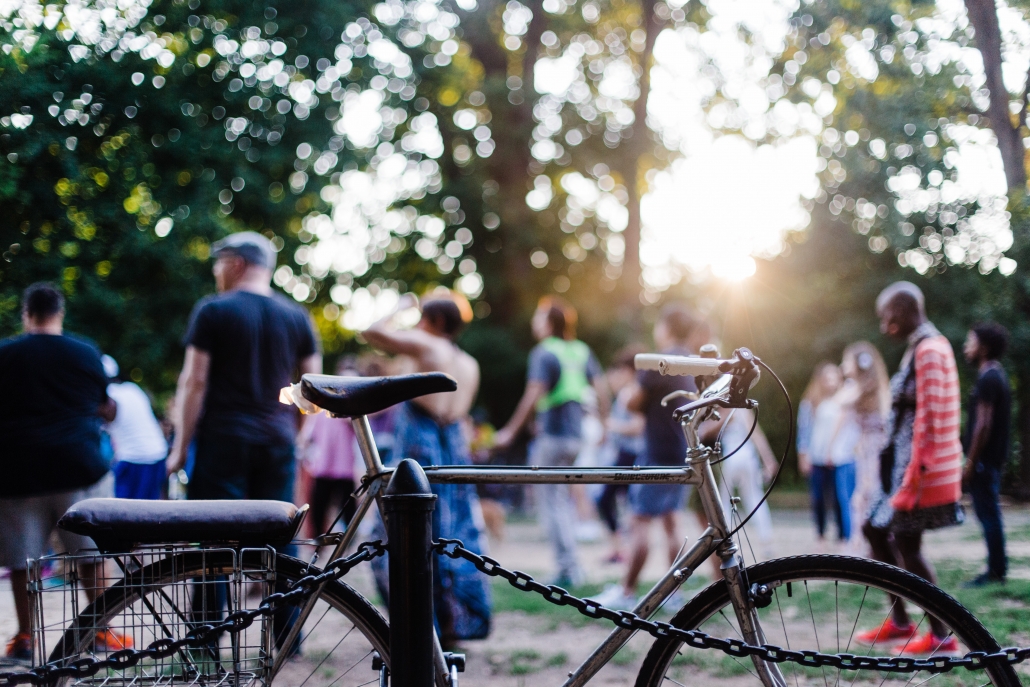
After all this talk of burden and guilt, the last thing I’m going to do is tell you to do more. If individual swaps is where you’re at, that is great. The more people making sustainable choices, the better. I applaud your efforts.
But if you’re feeling that you’re at a place where you are ready to do more, here are some ideas.
- Use your voice. Start conversations, share ideas, acknowledge successes and call out concerns.
- Demand action from those in power. Write letters or send emails to your local council or MPs. Tell them what you’re frustrated with and what you’d like to see them act on, and tell them how you’d like them to act. What is it that you’d like them to do? Ask them to reply to you with their response.
- Get involved with your local community. Whether you’d like to join a political activism group or you’re more comfortable connecting with the community garden or heading to a sewing group, meeting the people who live where you live is the first step in strengthening your community.
- Donate where you can. If you’re in a position where you can donate money, think about the organisations you most want to strengthen. Would you prefer to donate to political groups, those working to improve the environment, alleviating poverty, improving access to education?
- Give your time. If you can’t afford to donate money, can you donate your time instead? Volunteering for tree planting or food rescue, ocean and river cleanups, working in a charity shop or manning a stall at a festival are all options.
Individual actions matter. But the biggest change will come not when we skip the plastic bag and refuse the disposable coffee cup, but when we start to think about how we can influence those around us, and connect with others to amplify our impact.
Now I’d love to hear from you! How do you feel about individual action? How have your thoughts on this changed over time? Do you have any suggestions for ways we can amplify our impact beyond simple swaps? Please share your thoughts in the comments below!
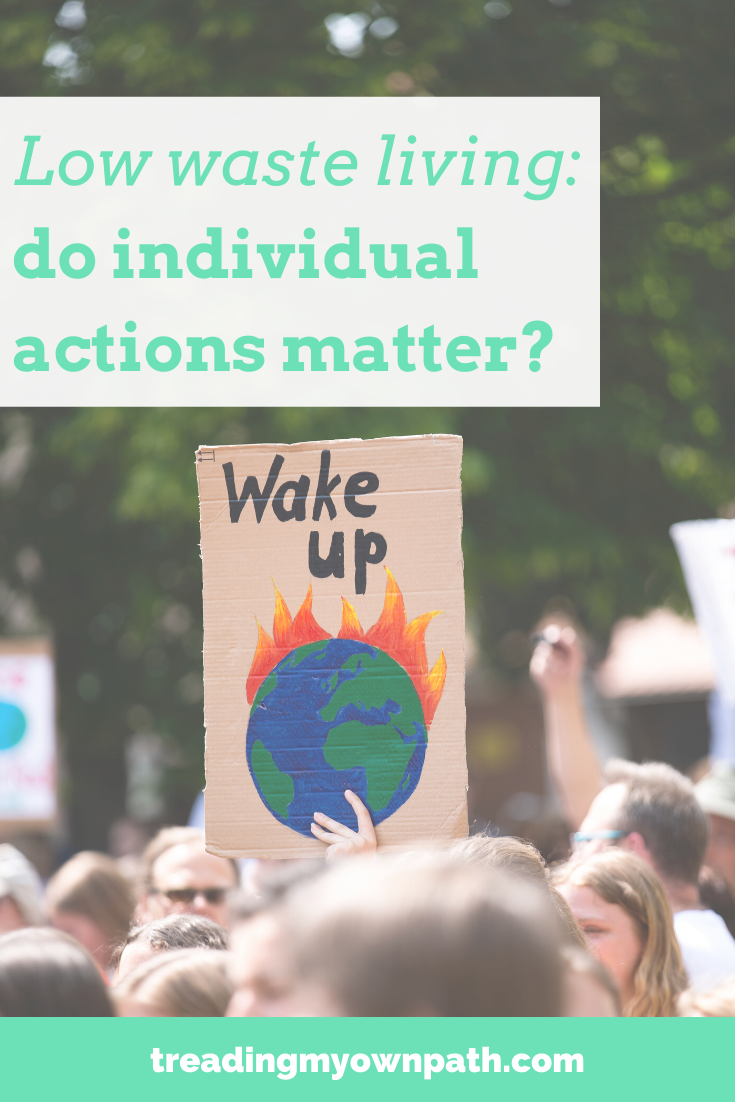

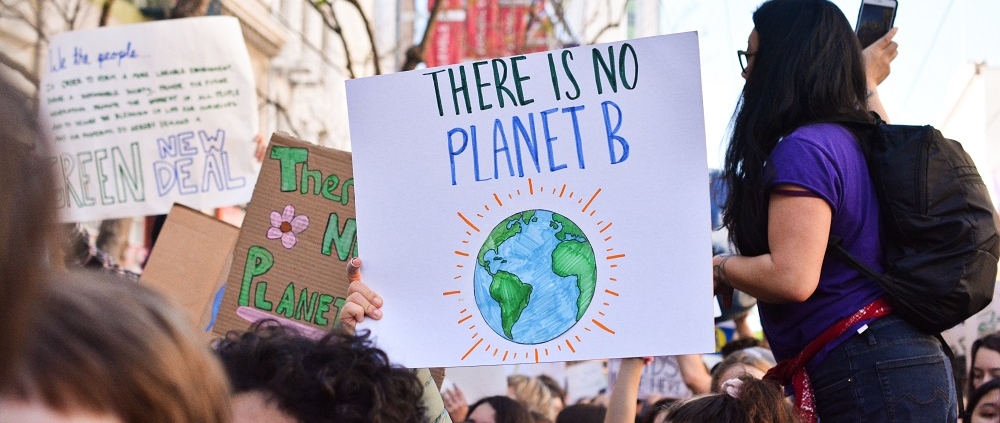
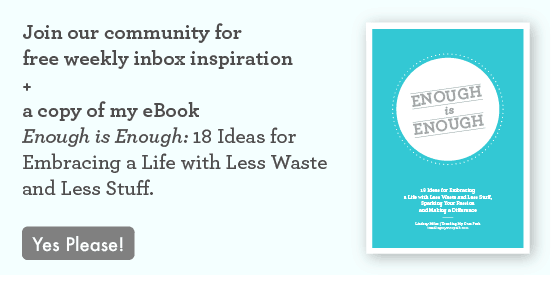




There’s an opportunity where I live in the UK to create a community resource for bulk buying stuff which we normally buy in plastic. Is there a blueprint / franchise for volunteers to follow?
Hi Ron, thanks for your message! Do you mean a ‘bulk buying’ group (a group of people who come together to buy groceries in bulk and then split them up) or do you mean something else? Let me know the specifics of what you are working towards and I will point you to the best person/resource that I know of to help! :)
Ron, I just came across this yesterday. Might be just what you are looking for: https://sistersagainstplastic.com/
Hi Lindsay,
I wrote a very similar post myself the other day, also in reaction to my feelings of anger and frustration over Australian bushfires. https://oldchookenterprises.com/2020/01/10/how-you-can-reduce-your-climate-change-impact/
According to some metastudies the biggest personal action we can take (especially in developed countries) is by having only one child to reduce overall consumption.
I am only just starting to get “really serious” about my own personal action in regards to things like plastic use, single use items etc and but I did choose to have only one child for this very reason way back in 1990. Now I need to get the rest of my house in order!
Hi Robyn, thanks for your comment. I just read your post (thanks for the link!) and lots of proactive tips – gotta love that!
I’m not really a lover of the ‘one less child / no children’ argument. First of all, I don’t consider my own carbon footprint to be anything to do with my parents, so why do parents feel they claim the ‘burden’ of their children’s?
It’s also not so simple as ‘refusing a plastic bag’. There are so many influences – biology, family pressure, culture, expectation, genetics…
My main frustration with it is that people then use it to blame poorer countries where birth rates are higher. Even though their footprints are a fraction of ours. I read today actually that it takes 12 days for a British person to produce the same carbon emissions as a person from an African country (Burkina Faso was the example) would produce in a year. So yes, having less children means less emissions, but we have an over-consumption problem here in Australia, UK, USA, western Europe – and I think talking about having/not having children deflects too much from that.
I hope that makes sense! I guess it comes right back to (and you talk about this in your post) – individual actions do matter, but ultimately we need governments and corporations to act to change the system and have the biggest impact.
I fully agree with Robyn. Number of people on the planet is equally as important as consumption patterns (Impact on the planet = number of people x per capita consumption). At the end of the day, even if every single person was an environmental angel, we still can’t keep growing our numbers indefinitely. Also, the many people that live in poorer countries understandably aspire to a better lifestyle, and that generally means higher consumption when they do achieve a higher living standard.
But anyway, it’s good to do what we can, so thanks Lindsay, for putting so many different ideas out there, it is inspirational!
Hi Claudia! Oh I’m not arguing with the facts, yes of c ourse you are right – more people means more strain on the planet. But the carbon footprint of a person isn’t equal throughout the world. For example, the average carbon footprint in 2018 for a person in Australia was 16.8 metric tons per person (16.1 in the USA and 5.6 in he UK) – versus 0.3 metric tons or less in Afghanistan, Burkina Faso, Central African Republic, Chad, Haiti, Madagascar, Mali (this isn’t an exhaustive list).
What this means is that in one day, people in Australia and the US create more carbon emissions than residents of those countries will do in a year.
So people in more economically developed countries (especially the USA and Australia) having less children means less carbon emissions, but a lot of these carbon emissions are related to infrastructure and other things rather than an individual leaving the light on all night. In fact there was a study that found that a homeless American eating in soup kitchens and sleeping in homeless shelters would still have a carbon footprint of 8.5 metric tons. That’s the ‘floor’ below which nobody in the US can reach.
On the other hand an average family in a country with 0.3 per person could have 26 children (and two parents) and still create less carbon emissions than a homeless person in the US.
My personal conclusions from this is that it isn’t fair to blame poorer countries with higher birth rates because they are still contributing less than those of us in developed countries, and that we need to call on governments and companies to do more because you are exactly right – individual action will never get us that low.
I really must write a full blog post on this sometimes because I think it is such an interesting topic!
Hi Lindsay, my biggest dilemma is how do we have these ‘conversations’ at work, with friends or family without sounding preachy, and judgemental? The few times I have tried in any case it seems to have had no effect anyway. How do you approach this? I find it the most difficult thing to negotiate.
Hi Fiona, I hope I can help here. I have been a Climate for Change Facilitator and have conversations with people all the time on Climate Change, whatever their level of understanding or acceptance.
The best way I have found is to lead by example by taking action (join a rally, write to your MP, divesting your bank/super/insurance from fossil fuels, donating to charities that advocate/take climate action).
Let people know what you’ve done and tell people why you have chosen to do something (because I am concerned/see this as a good action to take).
Be proud of what you do, own it. Sharing your learning’s with others will help you and them.
If confident ask people to join you (if on social media, share a link to where you have got your information/divested/donated). You don’t know until you ask – I learnt from fundraising for climate action many do want to support but I wouldn’t have known if I didn’t ask. A couple just said no and I respect that too).
People who are interested or confronted may ask questions and you can delve deeper then, but not using terms such as “you should” etc.
I have had many people in my life say they respect what I do (sustainability in work/life/play), they have changed something because they’ve seen me do it or I’ve shared information on it.
Often I’ll think I have no effect or I’ve told plenty of people what I’ve done and it can seem like it has no effect, but then a friend will tell me she has started a recycling station at work (small step but it’s a first step). Then I’ve ask that person to join me on the street at a rally. They’ve started to share what they do with others, because they care.
“From little things, big things grow” (Paul Kelly/Kev Carmody)
If you have a specific example you’d like help with, reply or PM me.
Hi Rachel! Thanks so much for sharing this. Lots of really great tips and I definitely agree with the ‘speaking from our own experience’ stance, and the ‘no should/ should not’ judgments. I just wrote an essay in response to Fiona’s comment so won’t add another, but really appreciate the good advice :)
Hi Fiona! I see that Sarah R has already replied with an in-depth answer with some great ideas, and I wanted to offer a slightly different take as an alternative (because different approaches work for different people and in different contexts).
I think framing is important, and connecting on shared values. There are a number of shared values that all humans have, but we care about them to different extents. So your colleagues might not appear to care about social justice, protecting the environment and unity with nature, but you might know that they value creativity, or family security, or responsibility. It’s thinking about how to frame the issue with what they think is important, so that there is a shared understanding. For example, you could talk about the bushfires in Australia as climate change and global warming and environmental destruction, or you could talk about it as the health impacts of smoke on society and particularly children, or the need to fund wildlife rescue operations to protect nature. Or it might be that they love creativity, so you discuss ideas for hosting a fundraiser and they can go nuts with their creativity, and so are engaged that way. I hope this makes sense. Figure out what they care about, and try to talk about the issue from that perspective.
And as Sarah R mentioned below, it is always best to talk about what you’re doing. Not trying to get them to do stuff. “I’m really worried about the bushfire smoke and the impact it had on school’s closing, and so I wrote to my MP / donated to a school bushfire fund / other thing .” Or “I want my kids to go to the beach and not be picking up all that plastic that washes up on the beach, and so I’ve stopped buying plastic snacks so I’m not contributing to the problem.” Etc etc.
Last thing – avoid judgment and ‘should’ statements. “I donated to a bush fire fund and you should to.” We never know what other’s circumstances are, and we can’t speak for them. “I donated to a bush fire fund and I felt really good – they emailed me back to say they are spending the money on XXX.” (You could add, if you’d like to donate, here’s the link )
Really it’s about planting seeds. You might not see action straightaway but you want people to mull things over, and maybe go away and do some more reading. The best thing is to try and be as open and positive as you can, so if they do want more info they feel comfortable asking you. If they think you’re a crazy activist who will try to recruit them to Extinction Rebellion, they are not going to approach you! if you are asked, just try to speak about what you do and why. And if you had any doubts/concerns that you overcame (I was really nervous about writing to my MP, but it only took about 10 minutes and I got a great reply back! etc etc) mention them.
Good luck!
Wonderful, thoughtful, inspiring article. Thanks so much for publishing this, Lindsay.
An inclusive approach to responding to the climate emergency is what we need, not “Your individual action is nice, but only collective action really matters.”
I loved this especially:
“Why wouldn’t we want to make the best choices that we can? If I know that there is a better option, I have access to that option and there are no barriers to me making that choice, it’s a no-brainer. ”
I’ve also been thinking lately that another way to frame this is that we will need so much fossil fuel to put in place a renewable energy grid. The more energy we consume with our individual actions, the more fossil fuel will be removed and burned.
Individual change = keeping fossil fuel in the ground
I am working with a team on an app to make it easier for all of us to integrate climate action into our lives. Check it out at https://fab.earth – fabe – for all a beautiful earth.
We’ve put together a library of over 400 actions – individual and collective – and plan to add many more. So many ways to have an impact!
Thanks so much for your work at Zero Waste Perth. What an inspiring group!
Hi Steven, thanks so much for taking the time to comment. Yes, I don’t think shooting down individual action as ‘not being enough’ helps anyone – definitely not the person who is making that action, but on a wider level too. We need to feel like our actions matter if we are going to continue, and if we are eventually going to challenge systems or speak up or wherever this action might lead us to.
I’ll check out your app website, thanks for sharing the link.
Simply loved the line – “If you can’t afford to donate money, can you donate your time instead”
I love reading your blog, Lindsay! They are always so informative and thought-provoking.
I love this article. We tend to think their is no point, we are one small person and what we do does not matter. I like the approach of not pointing fingers at who is and who is not being environmentally friendly. Rather be the best version of yourself do everything you can to be mindful of the environment. Action speak louder then words.
I know when I moved the city I found it very difficult at the time (because there was not much demand) to find local food. Farmers markets were once a week and across the city, They were normally during working hours. Our growing season in Canada is super short we have 4 months if we are super lucky to grow crops. This made it super hard to get food that was not from across the world or to our friendly neighbors.
I came across an indoor garden from Hope Innovations that allowed me to grow my own food in my tiny apartment. This has been a life saver for me as agriculture (mono culture crops) have a huge negative impact. I have been able to have fresh fruits and vegetables all year around. I feel great because I am not adding to the problem. People are drawn to it which opens up amazing conversations about the environment and our impact.
So thanks again for this great article as it inspires people as well as creates great conversation.
Thank you for this post! You’ve touched on so much of what I have been thinking about recently as I try to live a more environmentally-friendly lifestyle. My own personal changes seem so small in comparison to the size of the climate crisis and the lifestyle choices so ingrained in society. Thanks for tips on how to bring about bigger change by engaging community!
Great read, thanks for sharing! You make a really good point about leveling the playing field and ensuring we’re sharing information that ALL people can benefit from. As you mentioned, we’re finding (at Saving Our Green) that many of our reccomendations or suggestions are just not feasible for all people. We wonder what else could be done to ensure as many communities as possible can participate in this effort that requires participation from all. How can we tap into various situations more? How can we fold more people into the conversation? Would love to hear more of your thoughts and looking forward to the next post!
Very well written. Your blogs always impress me. Keep up the good work. Expecting the same from you.